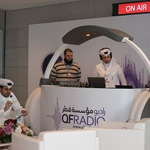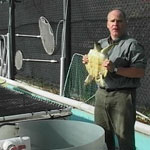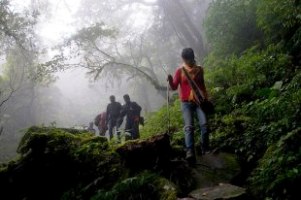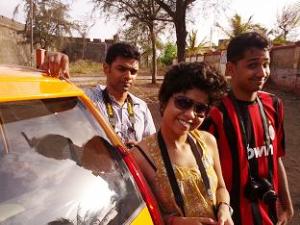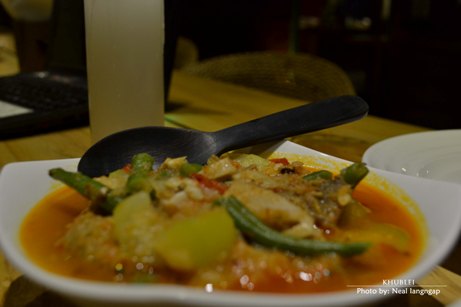Recently, during the question-answer session after the screening of our documentary ‘Bhraimoman Theatre – where Othello sails with Titanic’ when one person asked about the inspiration behind attempting the film, memories took a flight to an evening almost a decade back…
“So Bidyut, tell me about the theatre scene of Assam“ – Carl Miller, from UK’s famous Royal Court Theatre had asked me. It was a summer evening on 2003. I, along with couple of other friends, were sitting in the lawn of Jindal Guest House at the outskirt of Mumbai, sipping our evening tea. We were there as a part of a residential workshop call ‘Writers Block’ for ‘play writes’, organized by British Council of India in association with Royal Court, London. In fact, I was there more by fluke. Seeing an advertisement in the paper, Iapplied with the copy of astreet play which I wrote while in college (simply because my association with drama ended along with my college) and was pleasantly surprised to be selected! More so, while after landing there I realized that many of the other participants in the workshop are like who’s who of Indian Theatre’s play writing scene! So, quietly thanking my stars, I was got busy intrying to soak in as much as possible of the experience. I was mostlya silent listener of the discussions that used to take place in the evening, once the sessions were over. Hence Carl’s question took me by surprise.
After a brief pause, I told him that we don’t have much of a theatre movement in Assam of late, but we do have something called the mobile theatre. As I started narrating the concept of the mobile theatre, I could sense the growing interest amongst the listener and Carl’s eyes were lighting up! He started making plan for visiting Assam to experience mobile theatre first hand… and that was the first time I tried looking at the phenomenon of our ‘Bhraimoman Theatre’ from an outsider’s prospective. And perhaps it was then the realization hit me- it is indeed a unique phenomenon whose significance I was happily overlooking. A classic case of nearest from church, farthest from God!
Actually I had been shooting a bit and pieces of mobile theatre performances on my visits to Assam from 1998 onwards. The idea was just to make a short film (of around 5 minute duration) for the cultural magazine ‘Surabhi’ that used to be telecasted in DD and for which I used to work as one of the independent director. The interaction with Carl convinced me that a subject like mobile theatre deserved a much bigger platform…
Enter Mr. Srinivasan Narayanan, the present director of Mumbai Film Festival (MAMI) into the scene. Bravely, he decided to invest the money that he had kept aside for renovating his house and got his company ‘in2infotainment’ to co-produce the documentary with us… and we were set for the journey…
And what a journey it turned out to be! During the next two years in particular and a total of 8 years in general (yes, the first shot of the film was taken is 1998 and the final shot in August 2005), we re-lived the 40 odd years history of Assam’s ‘Bhraimoman Theatre…’ and as it happens in any journey, there are many a memorable moment which stayed fresh in my memory till date…
For example, playwright (late) Mahendra Borthakur. When we met him for the first time in the end of 2003 as a part of our research trip, he was full of stories. However when we made our trip almost six months later for the shoot…. he had lost his vocal cord to cancer! But the dreaded disease couldn’t really pull him down – he gave us a memorable interview for our film by scribbling his answer on my notebook!! Unfortunately, another renowned playwright of mobile theatre, (late) Bhaben Baruah was not even there to give us the interview in our return trip – an untimely death robbed him from us at his peak…
Veteran actor Mahananda Sharma had shared some amazing anecdote with us regarding his experience with two of Assam’s cultural stalwarts – Bhishnu Rabha and Phani Sharma. It so happened that they were performing in a small village in lower Assam. Phani Sharma was performing the role of Emperor Shah Jahan in the play under the same name, directed by Bishnu Rabha. Mahananda Sharma himself was playing the role of Shah Jahan’s son Dara. The morning after the show, Mr. Sharma walk out to have a cup of tea in the temporary shop next to the pandal. The elderly shop keeper complimented Sharma on his performance, but said that Phani Sharma erred in his portrayal of Shah Jahan. Taken aback, Mahananda Sharma asked him what he meant? The shopkeeper, in turn, asked Mr. Sharma which side of Shah Jahan was paralysed? Recollecting Phani Sharma on stage, Mahananda Sharma told him that it must be left side. The shop keeper countered saying that Shah Jahan was alive for 14 months after his paralytic attack – if he had left side paralysed, he couldn’t have survived that long as our heart is at the left side.Hence he must have been paralyzed on the right side!
The Shopkeeper also told him that the actor playing the role of Aurangzeb- renowned Rudra Chodhury - made a mistake as well. He signed the Dara’s death warrant by writing left to right, whereas it should have been signed right to left as those days the court’s language must have been signed either in Pharsi or Urdu!! When a crestfallen Mahananda Sharma went to Bhisnu Rabha with the feedback, Rabha said, ‘ Aache…iyatu manuh aache!’ (yes, we do have people here too!) before turning to shout at Phani Sharma that his slip-up has been exposed… Phani Sharma also admitted that he took that liberty as he used to find itconstraining to act with his right hand restricted! Later on, Mahanda Sharma came to know that the elderly shop keeper used to sell tea in Kolkata’s theatres -thus learning these nuances there. And yes, also that Bishnu Rabha and Phani Sharma felicitated him quietly for his minute observations…
The incident actually opened our eyes towards another often overlooked aspect of mobile theatre. It is well documented that mobile theatre provides the unique phenomenon of giving back to the places it perform some developments in kinds, besides entertaining its audience – viz., as most of these theatres are being invited for the benefit of a school/club/temple/library etc, the society in large benefits out of the money that the people spends in buying tickets for their entertainment. What more, these theatre companies also act as a window for outside worlds to many of its audience. Thanks to their plays, many illiterate or semi-literate viewers are introduced to world classics like Iliad and Odyssey, Hamlet or Crime & Punishment or to Hollywood blockbusters like Ben-Hur or Titanic!
Our encounter with yesteryears actress and wife of late playwright Bhaben Barua, Nalini Devi, was sad and inspiring at the same time. Sad because of the torture she had to undergo for being one of the pioneer girl in acting in mobile theatre. Society sort of ostracized her for that ‘crime’. While travelling to different places for performing, girls like her were not allowed to use the well or to eat with the other people… Even her father refused to give her off on marriage socially, asking her to take care of the marriage herself! However, she said with a defiant smile – ‘I’ve no regret for my actions… I was sure that the out-dated outlook of our society is going to change someday. Besides, I was really happy to have him as my husband – I definitely have no regret whatsoever!’
Unfortunately, our lack of respect towards history and preservation as a race is very much evident in mobile theatre movement as well. The people we interviewed, especially the old timers, were literally like treasure houses of anecdotes and fascinating stories of mobile theatre down the ages but ask them for some reference materials about the play, well, they draw a blank! There is simply no evidence or any kind of archival material at time, not even a simple ‘still photograph’ for reference of many of mobile theatre’s legendary plays – except in people memories!! This was also one of the major difficulty we faced while filming the documentary- a huge dearth of research material to fall back upon!! No, Iam not ready to accept lack of finance as an excuse for the same - for example, how much money would it cost for a mobile theatre group today to video-graph their plays live? And how many theatre groups do this exercise even today??
However,what I personally think as the real danger that Mobile theatre facing today is the lack of playwright. The absence of stalwarts like (late) Dr. B.N. Saikia or Mahendra Borthakur is being felt terribly due to lack of young, talented replacements. For the 40 odd mobile theatre companies, the requirement is of some 150 to 200 plays every year. But we have just a handful of playwright to meet these demands. The end result is sub-standard plays, as being experienced by Assam’s theatre going public of late. This definitely doesn’t argue well for the future of the biggest entertainment industry of northeast.










